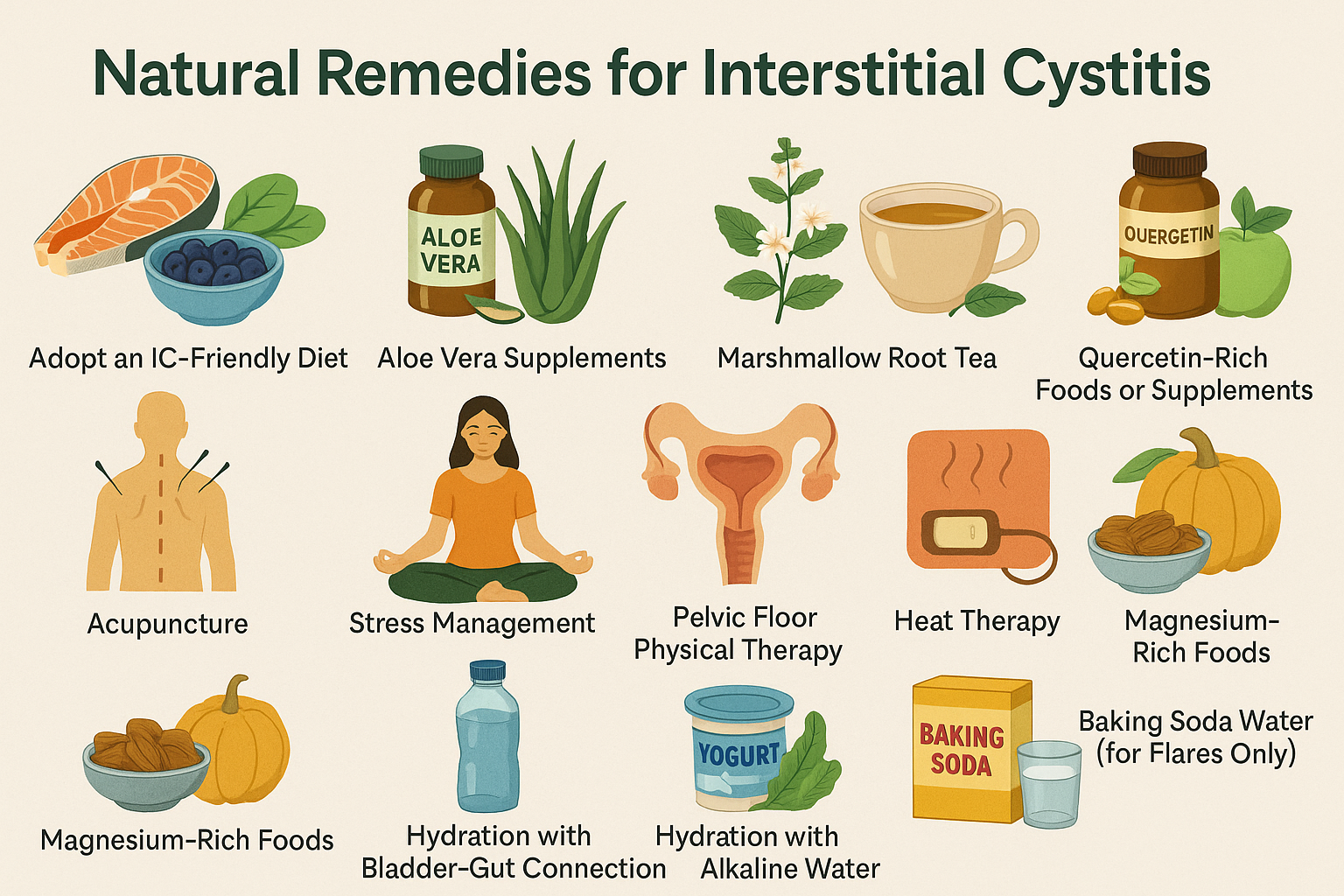Interstitial cystitis (IC), also known as painful bladder syndrome, is a chronic and often debilitating condition that disproportionately affects women. Characterized by pelvic pain, urinary urgency, and frequent urination, IC can severely impact quality of life. While conventional treatments exist, many patients are turning to natural remedies to complement their care plans and minimize symptoms. In this in-depth guide, we explore evidence-based natural treatments for interstitial cystitis, helping you reclaim comfort and control in your daily life.
👥 Who This Guide Is For
This article is designed for:
-
Women aged 25–60 who are actively searching for non-pharmaceutical treatments.
-
Natural health enthusiasts and holistic wellness followers.
-
Patients diagnosed with IC seeking lifestyle-based management.
-
Readers in the U.S., UK, and Canada who are researching dietary and integrative health options.
🔍 What Is Interstitial Cystitis?
Interstitial cystitis is a chronic inflammatory condition of the bladder wall. It can cause:
-
Pelvic or bladder pain
-
Pressure or discomfort
-
Urinary frequency (more than 8 times/day)
-
Urgency without infection
💡 What Are the Best Natural Remedies for Interstitial Cystitis?
The best natural remedies for interstitial cystitis include an anti-inflammatory IC diet, pelvic floor physical therapy, aloe vera supplements, marshmallow root tea, acupuncture, and stress-reducing techniques like yoga. These strategies may relieve symptoms, reduce flare-ups, and improve bladder health.
🌿 12 Natural Remedies for Interstitial Cystitis
1. Adopt an IC-Friendly Diet
An interstitial cystitis diet avoids common bladder irritants like:
-
Caffeine
-
Alcohol
-
Artificial sweeteners
-
Citrus fruits
Replace these with anti-inflammatory foods such as leafy greens, berries, and wild-caught salmon.
2. Aloe Vera Supplements
Studies show that aloe vera capsules may help soothe the bladder lining and reduce inflammation. Look for freeze-dried aloe with high acemannan content.
3. Marshmallow Root Tea
This soothing herbal tea coats the urinary tract and bladder walls, offering anti-inflammatory effects and relief from burning sensations.
4. Quercetin-Rich Foods or Supplements
Quercetin, a bioflavonoid found in apples and onions, has natural antihistamine and anti-inflammatory properties. It reduces IC pain and histamine-triggered flares.
5. Acupuncture
Acupuncture improves pelvic circulation and regulates nerve pathways involved in bladder sensitivity. Patients often report pain relief after 4–6 sessions.
6. Stress Management
Stress is a common flare trigger. Techniques like mindfulness, yoga, and guided breathing can help calm the nervous system and reduce bladder tension.
7. Pelvic Floor Physical Therapy
Many IC patients have overactive or tense pelvic muscles. Specialized therapy improves bladder control, reduces pressure, and enhances urinary function.
8. Heat Therapy
Applying a heating pad or warm compress to the lower abdomen can reduce spasms and relax the bladder during a flare-up.
9. Magnesium-Rich Foods
Magnesium helps regulate muscle function and nerve signals. Sources like pumpkin seeds, spinach, and almonds may reduce bladder spasms.
10. Probiotics for Bladder-Gut Connection
There is growing evidence of a gut-bladder axis. Restoring gut flora with probiotic-rich foods like kimchi or yogurt may reduce inflammation.
11. Hydration with Alkaline Water
Avoid acidic drinks and instead hydrate with filtered, alkaline water. Sipping throughout the day helps dilute urine and prevent irritation.
12. Baking Soda Water (for Flares Only)
In acute flares, a teaspoon of baking soda in a glass of water (used cautiously) may help neutralize urinary acidity. Always consult a doctor first.
🧠 What to Avoid with Interstitial Cystitis
Avoiding triggers is just as vital as adding remedies:
-
Spicy foods
-
Tomatoes
-
Carbonated drinks
-
High-potassium fruits
-
Tight clothing and synthetic underwear
-
Over-the-counter NSAIDs (which may irritate the bladder)
💼 Pro Tips: Expert Advice on Managing IC Naturally
-
Keep a symptom diary to identify food and stress-related flares.
-
Rotate supplements—don’t take all at once. Introduce slowly.
-
Work with a pelvic health physiotherapist familiar with IC.
-
Use apps like “IC Tracker” to log diet, hydration, and urination.
-
Choose glass water bottles—some plastic compounds may aggravate symptoms.
-
Join support groups like ICA (Interstitial Cystitis Association) for shared insights.
❓ Frequently Asked Questions (FAQ)
Can interstitial cystitis be cured naturally?
No known cure exists yet, but many patients manage their symptoms effectively using natural strategies, especially diet and pelvic therapy.
What foods calm the bladder?
Foods like cooked green beans, blueberries, wild rice, and chamomile tea are often well-tolerated by IC patients.
Is coffee always bad for interstitial cystitis?
Caffeine is a known irritant. Decaf coffee is tolerated by some, but herbal alternatives like chicory root or barley tea are safer.
Can stress really cause IC flare-ups?
Yes. Emotional stress activates nerve pathways linked to the bladder. Stress reduction is one of the most effective non-drug tools for relief.
How do I know if a supplement is IC-safe?
Choose brands labeled IC-friendly or consult with an integrative urologist. Avoid additives, citric acid, or artificial colorants.
💬 Have You Tried Any of These Natural Remedies?
Share your personal experiences, questions, or alternative tips in the comments below.
Your story may help someone else find relief. Let’s build a helpful community!



